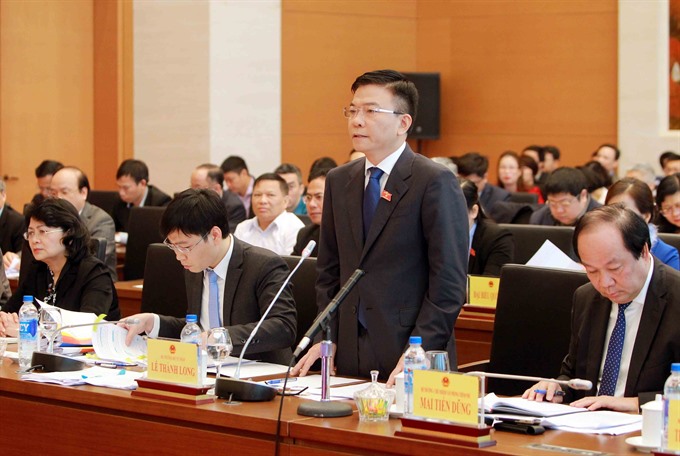 Politics & Law
Politics & Law

Law drafting agencies should ask for more time to prepare documents for laws if necessary instead of trying to complete the process in six months, Minister of Justice Lê Thành Long said at a National Assembly Standing Committee (NASC) meeting yesterday.
 |
| Minister of Justice Lê Thành Long speaks at the 22nd sitting of the National Assembly Standing Committee in Hà Nội yesterday. — VNA/VNS Photo An Đăng |
HÀ NỘI — Law drafting agencies should ask for more time to prepare documents for laws if necessary instead of trying to complete the process in six months, Minister of Justice Lê Thành Long said at a National Assembly Standing Committee (NASC) meeting on Monday.
The meeting discussed measures to ensure the progress and quality of law and ordinance projects, solutions to deal with delays in issuance of those projects’ elaborating documents and how to promote law dissemination and education among citizens.
This was the first time the NASC ran an immediate question-and-answer (Q&A) session during which legislators asked short and clear questions no more than a minute long, and the respondents immediately provided answers no more than three minutes long.
NA deputy Trần Văn Quý of Hưng Yên Province pointed out that many guiding documents for legislative documents that took effect on January 2018 are still missing, to which Long admitted that 12 guiding documents had not been issued.
The six-month time span given for a legislative document to take effect since it was passed by the NA is the main reason for the delay, he said.
“The number of guiding documents that need to be issued is massive while we only have six months to prepare them all,” he said. “Some laws are complicated and need several guiding documents, for example the Law on Tourism needs 34 and the Law on Foreign Trade Management needs 14-15.”
He proposed that agencies, when necessary, should ask the NA to extend the six month period to better prepare documents. The justice ministry, as the appraising agency, will collaborate with drafting agencies and provide consultation, he said.
NA deputy Trương Minh Hoàng of Cà Mau Province asked why some law projects were withdrawn from the 2018 Law and Ordinance Development Programme.
Long said there were several reasons, including the fact that some agencies deemed projects infeasible from the beginning. For example, developing the Law on Planning will require the amendments of 25 other laws, he said.
“The large number of law projects is another influencing factor,” he added. “There were some projects that need to be prioritised for development such as the Law on Public Investment, because it has direct effects on the development of enterprises and growth of the country.”
The number of law projects withdrawn from the programme has decreased from 12 in 2016 to nine in 2017, and to only one in 2018, which is a positive sign that the law drafting process is improving, Long said. Ten projects have been added to the programme this year, he added.
The Justice Ministry has made considerable efforts in law dissemination and education for the public, Long said in response to Vice President Nguyễn Thị Ngọc Thịnh’s question on how to better celebrate Việt Nam’s Law Day.
“The ministry has issued information and instructions for different sectors on how to incorporate laws into entertainment and cultural activities. The online law competition we organised in 2017 attracted some 200,000 students,” he said.
The ministry will keep trying to diversify law education tactics and promote Law Day, he said.
Research must be transparent
In the afternoon session, Minister of Science and Technology Chu Ngọc Anh answered questions from NA deputies about using scientific research to improve labour productivity.
How much the State invests in scientific research projects each year and whether the projects’ are worth the investment was what concerned NA deputy Hoàng Đức Thắng of Quảng Trị Province, to which Minister Ngọc Anh said there are some inapplicable projects that “stay in the drawers”.
The ministry is focusing on restructuring the country’s scientific and technology research, he said.
About 2 per cent of the total State budget would be spent on the science sector in 2016-18 as per the NA’s resolution, he added. The finance and science ministries had constantly improved the financial mechanism for scientific research projects, he said.
Speaking at the session, Deputy Prime Minister Vũ Đức Đam said that the science and technology sector should develop realistic mechanisms that encourage innovation.
He added that everything related to scientific research must be transparent, including topic registration, results and the appraisal and review processes. — VNS




